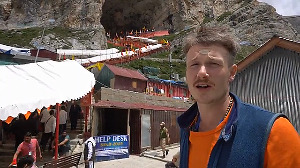The deal with Iran does not address any of the major issues thrown up by Tehran's ambitions, says Claude Smadja. There are a few considerations to keep in mind when one is assessing the interim nuclear agreement reached recently in Geneva between Iran and six world powers.
There are a few considerations to keep in mind when one is assessing the interim nuclear agreement reached recently in Geneva between Iran and six world powers.
First, the Iranians are among the best, toughest negotiators in the world. They stayed true to form in Geneva, doing a good job of avoiding anything that would mean a renunciation of Iran's nuclear ambitions.
Second, US President Barack Obama and his administration had, for all practical purposes, taken military options off the table.
Third, Obama and the people around him were, at the same time, dying for an agreement to be able to claim some sort of diplomatic success -- given the Obamacare disaster and the precipitous decline of the president's prestige and credibility at home and abroad.
Fourth, the interim agreement is a pragmatic way to buy time in order to tackle the major challenge of dealing with Iran as a potential nuclear power. It is just a "pause", and definitely not a rollback of the nuclear programme. Moreover, it does not address any of the major issues surrounding Tehran's ambitions.
Finally, the agreement not only marks the reopening of lines of communication between Washington and Tehran after 35 years of open animosity, it also starts the process of the reintegration of Iran on the world scene.
The general tone of Iran's media after the signing of the agreement is that the regime considers that what has been signed in Geneva does, in fact, amount to a recognition of what Iranian President Hassan Rouhani calls "Iran's nuclear rights" and that it is a "protection of the country's nuclear achievements".
There is more than just propagandists' spin behind these claims: while the Geneva agreement freezes Tehran's efforts for the moment, it does not stipulate the destruction or the downgrading of the infrastructure built by the regime to develop the country's nuclear capabilities.
Steps that Iran is mandated to take, such as "diluting" its stockpile of enriched uranium from the present level of 20 per cent (weapons- grade) to five per cent (civilian use), could be reversed overnight if further negotiations are not conclusive.
In the same way, the agreement does not stop the development of the Arak nuclear reactor (it only mentions that no enrichment will take place as long as the interim agreement lasts); nor does it say anything about the military site of Parchin.
The key question now is: what will be made of the time that the interim deal buys to reach a final agreement addressing Iran's nuclear programme?
First, of course, is the key question of how the Iranians will implement their part of the deal. How sure can we be that Washington will respond as firmly as it should in case of cheating, knowing how eager the White House is to have a deal, and knowing also how President Obama fumbled when his famous "red line" was crossed by Syria's Bashar al-Assad?
Another key challenge is the fact that the scope for manoeuvre in both camps is extremely limited. In Tehran, Washington and European capitals, there are very strong forces intent on preventing a final agreement from being reached. There is no underestimating the determination of Iran's supreme leader, Ali Khamenei, and of the hardliners around him to do whatever it takes to make Iran a nuclear power.
On the European and American sides, there is also no underestimating the suspicion about Tehran's intentions and ultimate objectives. In that respect, the precedent of North Korea -- and how it ignored agreements in order to create a fait accompli and become a nuclear power -- weighs heavily on people's minds. In the same way, one cannot dismiss the possibility that the US Congress might be a spoiler in the deal by enacting new sanctions that would take effect if the interim deal is not followed by a final agreement.
Even without any cheating or domestic pressure to worry about, there is no underestimating the difficulties that lie ahead, as illustrated by the contradictory interpretations put forward by US Secretary of State John Kerry and Mr Rouhani about the significance of the interim deal. We are still stuck with an unmovable dilemma: Iran wants to be a nuclear power -- and wants to be recognised as such -- while the Americans and the Europeans are still hoping to prevent Tehran from reaching that stage or at least from being officially recognised and endorsed as a de facto member of the nuclear club.
One point that cannot be ignored is how the Geneva deal has led to an extraordinary and unlikely convergence between Israel and Saudi Arabia, which are united in their fierce opposition to a deal that does not roll back Tehran's nuclear capabilities while at the same time opens the door to Iran's diplomatic reintegration. Both countries will keep the pressure on and will use whatever leverage they have in Washington and in Europe to raise the ante in the hope that the final agreement would meet at least some of their shared concerns.
Another kind of risk lies in the well-established tendency in the US and Europe to imagine that once a negotiation has started, it almost automatically has to end with an agreement. This sort of eagerness for an agreement -- especially acute in the case of the Iranian nuclear issue --creates a very serious risk: American and European negotiators can end up negotiating among themselves, while the Iranians just stick to their guns and wait for exhaustion to prevail in the opposite camp so that they can achieve their objectives. Kerry's eagerness to get a deal even on November 10, despite the fact that this was an even more imperfect agreement than the one achieved on November 23, does not bode well in that respect.
Let's face it: the Geneva deal might be the best that could be achieved in the present circumstances, but it does not diminish the acuteness of the challenges and the risks created by Iran's nuclear ambitions -- which are as pronounced today as they were before the interim agreement. And, so far, neither the Europeans nor the Americans have proved that they are still ready to keep all the options on the table should a satisfactory final deal elude them. If I were Rouhani or Khamenei, I would tend to think that things are not going so badly after all.
The writer is president of Smadja and Smadja, a strategic advisory firm
Image: US Secretary of State John Kerry gestures during a news conference after nuclear talks in Geneva
Photograph: Reuters












